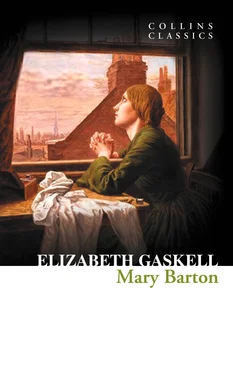Such were the castles in air, the Alnaschar-visions in which Mary indulged, and which she was doomed in after days to expiate with many tears.
Meanwhile, her words – or, even more, her tones – would maintain their hold on Jem Wilson’s memory. A thrill would yet come over him when he remembered how her hand had rested on his arm. The thought of her mingled with all his grief, and it was profound, for the loss of his brothers.
* ‘Lile’, a north-country word for ‘little’. ‘Wit leil labour to live.’ – Piers Plowman .
† ‘May happen’, perhaps.
Margaret’s Début as a Public Singer
‘Deal gently with them, they have much endured.
Scoff not at their fond hopes and earnest plans,
Though they may seem to thee wild dreams and fancies.
Perchance, in the rough school of stern Experience,
They’ve something learned which Theory does not teach;
Or if they greatly err, deal gently still,
And let their error but the stronger plead
“Give us the light and guidance that we need!”’
‘LOVE THOUGHTS’
One Sunday afternoon, about three weeks after that mournful night, Jem Wilson set out with the ostensible purpose of calling on John Barton. He was dressed in his best, his Sunday suit of course; while his face glittered with the scrubbing he had bestowed on it. His dark black hair had been arranged and rearranged before the household looking-glass, and in his button-hole he stuck a narcissus (a sweet Nancy is its pretty Lancashire name), hoping it would attract Mary’s notice, so that he might have the delight of giving it her.
It was a bad beginning of his visit of happiness that Mary saw him some minutes before he came into her father’s house. She was sitting at the end of the dresser, with the little window-blind drawn on one side, in order that she might see the passers-by, in the intervals of reading her Bible, which lay open before her. So she watched all the greeting a friend gave Jem; she saw the face of condolence, the sympathetic shake of the hand, and had time to arrange her own face and manner before Jem came in, which he did, as if he had eyes for no one but her father, who sat smoking his pipe by the fire, while he read an old Northern Star , borrowed from a neighbouring public-house.
Then he turned to Mary, who, he felt through the sure instinct of love, by which almost his body thought, was present. Her hands were busy adjusting her dress; a forced and unnecessary movement, Jem could not help thinking. Her accost was quiet and friendly, if grave; she felt that she reddened like a rose, and wished she could prevent it, while Jem wondered if her blushes arose from fear, or anger, or love.
She was very cunning, I am afraid. She pretended to read diligently, and not to listen to a word that was said, while in fact she heard all sounds, even to Jem’s long, deep sighs, which wrung her heart. At last she took up her Bible, and as if their conversation disturbed her, went upstairs to her little room. And she had scarcely spoken a word to Jem; scarcely looked at him; never noticed his beautiful sweet Nancy, which only awaited her least word of praise to be hers! He did not know – that pang was spared – that in her little dingy bedroom stood a white jug filled with a luxurious bunch of early spring roses, making the whole room fragrant and bright. They were the gift of her richer lover. So Jem had to go on sitting with John Barton, fairly caught in his own trap, and had to listen to his talk, and answer him as best he might.
‘There’s the right stuff in this here Star and no mistake. Such a right-down piece for short hours.’
‘At the same rate of wages as now?’ asked Jem.
‘Aye, aye! else where’s the use? It’s only taking out o’ the masters’ pocket what they can well afford. Did I ever tell yo what th’ Infirmary chap let me into many a year agone?’
‘No,’ said Jem listlessly.
‘Well! yo must know I were in th’ Infirmary for a fever, and times were rare and bad, and there be good chaps there to a man, while he’s wick, * whate’er they may be about cutting him up at after. † So when I were better o’ th’ fever, but weak as water, they says to me, says they, “If yo can write, you may stay in a week longer, and help our surgeon wi’ sorting his papers; and we’ll take care yo’ve your bellyful of meat and drink. Yo’ll be twice as strong in a week.” So there wanted but one word to that bargain. So I were set to writing and copying; th’ writing I could do well enough, but they’d such queer ways o’ spelling, that I’d ne’er been used to, that I’d to look first at th’ copy and then at my letters, for all the world like a cock picking up grains o’ corn. But one thing startled me e’en then, and I thought I’d make bold to ask the surgeon the meaning o’t. I’ve getten no head for numbers, but this I know, that by far th’ greater part o’ the accidents as comed in happened in th’ last two hours o’ work , when folk getten tired and careless. Th’ surgeon said it were all true, and that he were going to bring that fact to light.’
Jem was pondering Mary’s conduct; but the pause made him aware he ought to utter some civil listening noise; so he said:
‘Very true.’
‘Ay, it’s true enough, my lad, that we’re sadly overborne, and worse will come of it afore long. Block-printers is going to strike; they’n getten a bang-up’ Union, as won’t let ’em be put upon. But there’s many a thing will happen afore long, as folk don’t expect. Yo may take my word for that, Jem.’
Jem was very willing to take it, but did not express the curiosity he should have done. So John Barton thought he’d try another hint or two.
‘Working folk won’t be ground to the dust much longer. We’n a’ had as much to bear as human nature can bear. So if th’ masters can’t do us no good, and they say they can’t, we mun try higher folk.’
Still Jem was not curious. He gave up hope of seeing Mary again by her own good free-will; and the next best thing would be, to be alone to think of her. So muttering something which he meant to serve as an excuse for his sudden departure, he hastily wished John good-afternoon, and left him to resume his pipe and his politics.
For three years past trade had been getting worse and worse, and the price of provisions higher and higher. This disparity between the amount of the earnings of the working classes and the price of their food, occasioned, in more cases than could well be imagined, disease and death. Whole families went through a gradual starvation. They only wanted a Dante to record their sufferings. And yet even his words would fall short of the awful truth; they could only present an outline of the tremendous facts of the destitution that surrounded thousands upon thousands in the terrible years 1839, 1840, and 1841. Even philanthropists who had studied the subject, were forced to own themselves perplexed in their endeavour to ascertain the real causes of the misery; the whole matter was of so complicated a nature, that it became next to impossible to understand it thoroughly. It need excite no surprise, then, to learn that a bad feeling between working men and the upper classes became very strong in this season of privation. The indigence and sufferings of the operatives induced a suspicion in the minds of many of them, that their legislators, their magistrates, their employers, and even the ministers of religion, were, in general, their oppressors and enemies; and were in league for their prostration and enthralment. The most deplorable and enduring evil that arose out of the period of commercial depression to which I refer, was this feeling of alienation between the different classes of society. It is so impossible to describe, or even faintly to picture, the state of distress which prevailed in the town at that time, that I will not attempt it; and yet I think again that surely, in a Christian land, it was not known even so feebly as words could tell it, or the more happy and fortunate would have thronged with their sympathy and their aid. In many instances the sufferers wept first, and then they cursed. Their vindictive feelings exhibited themselves in rabid politics. And when I hear, as I have heard, of the sufferings and privations of the poor, of provision shops where ha’porths of tea, sugar, butter, and even flour, were sold to accommodate the indigent, – of parents sitting in their clothes by the fireside during the whole night for seven weeks together, in order that their only bed and bedding might be reserved for the use of their large family, – of others sleeping upon the cold hearthstone for weeks in succession, without adequate means of providing themselves with food or fuel (and this in the depth of winter), – of others being compelled to fast for days together, uncheered by any hope of better fortune, living, moreover, or rather starving, in a crowded garret, or damp cellar, and gradually sinking under the pressure of want and despair into a premature grave; and when this has been confirmed by the evidence of their careworn looks, their excited feelings, and their desolate homes, – can I wonder that many of them, in such times of misery and destitution, spoke and acted with ferocious precipitation?
Читать дальше












